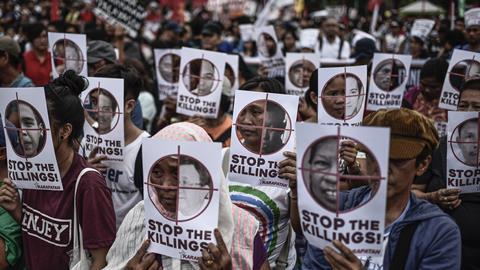International Criminal Court probe into thousands of deaths prompts backlash from president.
The Philippines government has responded to the International Criminal Court’s probe into its state-sanctioned killings in the country’s ‘war on drugs’ by announcing its withdrawal from the court. It is the latest country to test the court’s authority with a threatened pullout. In 2016 Russia withdrew after a file was opened on its annexation of Crimea, and later the same year the court’s apparent focus on African indictees prompted three to announce their intention to withdraw.
Philippines President Rodrigo Duterte ran for election on a controversial ‘anti-drugs’ platform that backed summary execution of people involved in the drugs trade. The government admits to 4,000 killings, though human rights groups set the number at over 12,000.
The ICC’s focus on the Philippines intensified on 8 February, when the chief prosecutor announced she had opened a ‘preliminary examination’ on the country.
The presidential palace said: ‘The president’s decision to withdraw from the Rome Statute was a result of the International Criminal Court (ICC) prosecutor Fatou Bensouda’s violation of the principle of complementarity.’
Duterte’s spokesman added: ‘In the Philippines, not only do we have a functioning judiciary, and I think no one can dispute that. We also have a domestic statute, which mirrors the crimes cognisable by the International Criminal Court.’
The ICC has said Philippines withdrawal would not end its preliminary investigations, and would not alter future investigation and indictment decisions. The ICC’s governing statute says a state remains a full member for one year after an official withdrawal notice. The Philippines government contests this, saying the requirement is ‘voided’ by the chief prosecutor’s ‘fraudulent behaviour’.
The position of the Philippines has highlighted the ICC’s major challenge – its ambition to investigate and indict individuals who still hold public office. In 2016 its ongoing pursuit of Sudan’s president Omar Al Bashir prompted regional powerbroker South Africa to announce withdrawal from the ICC, though this has not occurred. Gambia, which also intended to withdraw, remains a full member.
Of what looked like a wave of departures in 2016, only Russia and Burundi actually left. In common with South Africa, the Philippines has strong civil society groups and a viable political opposition, both features deemed key to South Africa’s continuing membership.
ICC members are committed to co-operate with court orders, and 18 of the Philippines’ Asia-Pacific neighbours are ICC members. The court’s ability to enforce against states in breach of that commitment is, however, weak.
The ICC’s case report on the Philippines notes: ‘It has been alleged that since 1 July 2016, thousands of persons have been killed for reasons related to their alleged involvement in illegal drug use or dealing. While some of such killings have reportedly occurred in the context of clashes between or within gangs, it is alleged that many of the reported incidents involved extra-judicial killings in the course of police anti-drug operations.’




























No comments yet